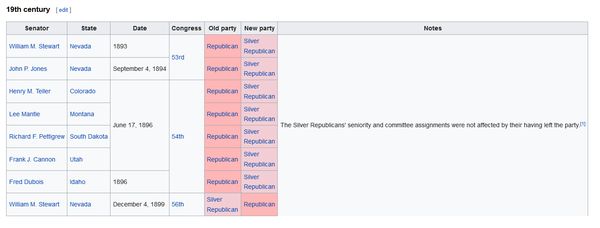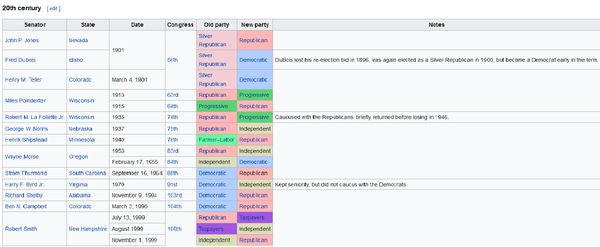Just passing on something we should remember
Apr 12, 2020 00:30:25 #
maximus
Loc: Chattanooga, Tennessee
permafrost wrote:
Max, the refusal to accept clear historical fact b... (show quote)
Here's a link that says the so called switch was over big business vs small business. It doesn't even mention civil rights.
https://www.livescience.com/34241-democratic-republican-parties-switch-platforms.html
Apr 12, 2020 00:42:38 #
maximus
Loc: Chattanooga, Tennessee
permafrost wrote:
Max, the refusal to accept clear historical fact b... (show quote)
Here's a link that backs your views.
https://medium.com/everyv**e/how-the-republicans-and-democrats-switched-on-civil-rights-in-5-r****t-steps-92c1b41480b
But here are 3 charts that list every single politician that switched parties from 1893 on up.
Wheres the 'big switch'? I thought they would be easier to read but you can see the list isn't very long to cover 127 years, and there seems to be no big switch.



Apr 12, 2020 07:58:00 #
maximus wrote:
I HAVE done my research. There was only a small nu... (show quote)
There aren't any v****g numbers, on when and where people have been switching parties since the civil war, in the masses several times over.You don't know what you're talking abou,t just full of contempt.
Apr 12, 2020 10:13:00 #
maximus
Loc: Chattanooga, Tennessee
Barracuda2020 wrote:
There aren't any v****g numbers, on when and where people have been switching parties since the civil war, in the masses several times over.You don't know what you're talking abou,t just full of contempt.
Excuse me...where did you see any contempt on my part? What I posted was 99.9% reprinted. My understanding was that we were talking about government making the big switch, and that's what I researched and provided.
If you read the articles I posted, one said that a switch took place in the late 1800's over the new western states. Both parties wanted those states. Republicans had become big business and had left the 'little' man out, in the sense that no money was set aside for them. So. the democrats ran on the platform that the little man would get something too, and it worked. S***ery or civil rights weren't even mentioned in this article. But, also. this was the beginning of the switch of republicans being big business, ( big government), to democrats being big government in order to have the money to give to the little man.
All this time, the black v**e was strong republican. Then, when the great depression hit, and FDR ran on the 'New Deal', that made democrat government bigger in order to have the money for the new social programs. B****s started v****g democrat for these benefits, even though they were reluctant to do so.
There WAS a big v**er switch after the Civil Rights Acts was passed because of LBJ. Barry Goldwater was labeled r****t because he v**ed against this bill, not out of r****m, but because he believed that it was an overreach of federal government over state's rights. The DNC and LBJ used that v**e to label him r****t without ANY evidence. Ads were made to discredit Goldwater on this basis. It worked so well that LBJ won in a landslide. The 4 min ad that a republican made WAS ran, as far as I can find out. The Daisy ad was run on network TV just one time. But these ads worked and the democrats used them to sew the seeds that republicans were r****t. It just wasn't true.
What I just wrote are my own words, nevertheless, you can easily find the articles that I am paraphrasing. I see NO contempt in anything I have written. I used my own words this time because reprinting articles is a LONG boring read most of the time, and people tend to not read long posts.
Apr 12, 2020 12:15:45 #
maximus wrote:
After the assassination of President John F. Kenne... (show quote)
max, your rebuttals read as if they came from Liberty University..
I know it must be hard for you to accept the fact that today, in the 21st century, the r****t h**ers identify as republicans or right wingers.. just as the same kind of r****t h**ers in the past identified as Democrats..
H**e lives not in a party name, but in the character of the h**ers, now in this day, that is the right wing republicans.. no other way to call it..
The orange mistake slithered into the oval office on the backs of these hating people..
Happy easter to you and yours.. and stay safe..

Apr 12, 2020 12:32:09 #
maximus wrote:
In the Senate, Republicans picked up four southern... (show quote)
Max, we have been trying to recover from the Reagan economy for 50 years near..
Papa Bush had to change policy and was even forced to drop his "no new taxes" pledge..
Ronnie himself had to steal the SS solution money to repair his policies..
https://prezi.com/ceqfr0jhabcz/george-hw-bush-and-economic-policy/
The Economy
At the beginning of Bush's administration, the economy Reagan had claimed was peaceful and prosperous was really nearing a recession.
Bush inherited economic issues that had been either caused by or simply ignored by the Reagan administration.
Pressures on the economy included overbuilt commercial real estate resulting in deposit insurance and lax regulation, weakness in financial institutions, and decreased defense expenditures.

Apr 12, 2020 12:41:49 #
maximus wrote:
Here's a link that says the so called switch was over big business vs small business. It doesn't even mention civil rights.
https://www.livescience.com/34241-democratic-republican-parties-switch-platforms.html
https://www.livescience.com/34241-democratic-republican-parties-switch-platforms.html
Interesting article Max,, and I , at least , should remember that never is political action only about a single issue.. not now, not ever..
Spring shipping out of Duluth..

Apr 12, 2020 12:44:20 #
maximus
Loc: Chattanooga, Tennessee
permafrost wrote:
max, your rebuttals read as if they came from Libe... (show quote)
Happy Easter! He is risen!
Apr 12, 2020 12:53:10 #
maximus
Loc: Chattanooga, Tennessee
permafrost wrote:
max, your rebuttals read as if they came from Libe... (show quote)
You are right that racial h**ers identify as right wing, but we have no control over how someone identifies themselves. Take A****A for instance, they h**e just as bad but for different reasons. The people you're talking about and the people I'm talking about are extreme and should not be included in either party. I don't believe that there are enough of these extremists to sway an e******n...on either side.
Now, people like you and I can debate and be on differing platforms but I don't h**e you and would never seek to cause you any harm and I know you feel the same way. However possible, ( barring violence), the i***ts on both sides need to be expelled.
Apr 12, 2020 13:03:01 #
maximus wrote:
You are right that racial h**ers identify as right... (show quote)
Very well put Max.. I agree with you on all of that.. and do hope it is correct..
The only Loons I like...

Apr 13, 2020 01:50:41 #
maximus wrote:
Here's a link that backs your views.
https://medium.com/everyv**e/how-the-republicans-and-democrats-switched-on-civil-rights-in-5-r****t-steps-92c1b41480b
But here are 3 charts that list every single politician that switched parties from 1893 on up.
Wheres the 'big switch'? I thought they would be easier to read but you can see the list isn't very long to cover 127 years, and there seems to be no big switch.
https://medium.com/everyv**e/how-the-republicans-and-democrats-switched-on-civil-rights-in-5-r****t-steps-92c1b41480b
But here are 3 charts that list every single politician that switched parties from 1893 on up.
Wheres the 'big switch'? I thought they would be easier to read but you can see the list isn't very long to cover 127 years, and there seems to be no big switch.
Dude, it's not about the politicians switching, it's about the people, the base.
Apr 13, 2020 02:22:59 #
permafrost wrote:
NYT: The Reagan Boom - Greatest EverMax, we have been trying to recover from the Reaga... (show quote)
Almost everyone knows that the greatest depression the U.S. ever had was in the 1930's. It was known as the Great Depression, and its infamy merits a separate section in economics textbooks. But what was its counterpart? When did our greatest economic expansion occur?
We just had it. And it is still expanding, setting new records with each passing month.
We don't know whether historians will call it the Great Expansion of the 1980's or Reagan's Great Expansion, but we do know from official economic statistics that the seven year period from 1982 to 1989 was the greatest, consistent burst of economic activity ever seen in the U.S. In fact, it was the greatest economic expansion the world has ever seen - in any country, at any time.
The two key measures that mark a depression or expansion are jobs and production. Let's look at the records that were set. Creation of jobs. From November 1982, when President Ronald Reagan's new economic program was beginning to take effect, to November 1989, 18.7 million new jobs were created. It was a world record: Never before had so many jobs been created during a comparable time period. The new jobs covered the entire spectrum of work, and more than half of them paid more than $20,000 a year. As total employment grew to 119.5 million, the rate of unemployment fell to slightly over 5 percent, the lowest level in 15 years. Creation of wealth.
The amount of wealth produced during this seven year period was stupendous - some $30 trillion worth of goods and services. Again, it was a world record. Never before had so much wealth been produced during a comparable period. According to a recent study, net asset values - including stocks, bonds and real estate - went up by more than $5 trillion between 1982 and 1989, an increase of roughly 50 percent.
There are other important measures. Steady economic growth. As we begin the decade of the 1990's, we are in our 86th straight month of economic growth - a new record for peacetime, five months longer than the wartime growth of World War II and only 23 months short of the wartime record set during the Vietnam War in the 1960's. Most experts now predict that it will last right through 1990, and perhaps beyond.
Income tax rates, interest rates and inflation.
Under President Reagan, top personal income tax rates were lowered dramatically, from 70 percent to 28 percent. This policy change was the prime force behind the record breaking economic expansion. Interest rates and inflation also fell sharply and, so far, have stayed comfortably low - a further indication of the power and pervasiveness of Mr. Reagan's economic policies. The stock market. Perhaps the key indicator of an economy's booms and busts is the stock market, the bottom line economic report card. And here the record has been striking. During the period from 1970 to 1982, the stock market barely moved. The Standard & Poor's index of 500 stocks inched up about 35 percent during that entire period. But starting in late 1982, just as Reaganomics began to work, the stock market took off like a giant skyrocket. Since then, the Standard & Poor's index has soared, reaching a record high of 360, almost triple what it was in 1982.
There were other consequences of the expansion. Annual Federal spending on public housing and welfare, and on Social Security, Medicare and health all increased by billions of dollars. The poverty rate has fallen steadily since 1983.
When you add up the record of the Reagan years, and the first year of President Bush - during which he has faithfully continued Mr. Reagan's economic policies - the conclusion is clear, inescapable and stunning. We have just witnessed America's Great Expansion.
The Reagan economic expansion was not perfect and we will never have one that is. The Federal budget deficits were too high and still are, too many Federal regulations lay unreformed and the trade deficit is worrisome.
In fact, the Reagan expansion may not have been the best economic expansion in history, for every economic expansion must be judged by many criteria. But if we look at the sheer size and immensity of it, at its scope and power, then it cannot be denied that it was the greatest.
The full impact of the powerful economic recovery that President Reagan launched during the 1980s is still unfolding.
Mr. Reagan's expansion provided the financial resources to allow the U.S. to build up the combat capability of its defense forces and to begin blazing the new trail for a protective missile system. This, in turn, convinced the Soviet rulers they could never defeat the U.S., and today the Soviet Union and the U.S. are busily engaged in nuclear disarmament as peace breaks out in country after country throughout the world.
Equally important, it proved beyond doubt to all (except perhaps for a handful of left-wing faculty members in our best universities) that capitalism is superior to Socialism and C*******m. Our economy is the guiding beacon for all those countries that are ripping apart the ruthless collectivist regimes that ruined the lives of their people for so long.
One thing the Marxists got right: Economics is a powerful determining factor of history. But Marxists never dreamed it would be the economics of Ronald Reagan and all those capitalists that would prevail in the end.
Apr 13, 2020 09:14:09 #
Blade_Runner wrote:
b NYT: The Reagan Boom - Greatest Ever /b br br... (show quote)
Pretty dated stuff Blade, that times article was originally printed decades ago.. it also only speacks to the top of the food chain. What about the driving force of Americas golden years, the middle and working class?
what about the long term affects? What about the never accomplished recovery?
For the here and now.. problem of today..
https://today.duke.edu/2019/01/road-trump-began-reaganomics-loss-middle-class-economist-says
PUBLISHED JANUARY 29, 2019 IN ACADEMICS
THE ROAD TO TRUMP BEGAN WITH REAGANOMICS & THE LOSS OF THE MIDDLE CLASS, ECONOMIST SAYS
Donald Trump rise to the White House can be traced to President Reagan’s economic policies that “hollowed out the middle class.”
That’s according to an economic historian who laid out a slew of sobering data on income, taxes, Chinese imports, debt and more that he connected to across-the-board tax cuts that began in 1980.
“(Reaganomics) paved the way for Trumpism,” John Komlos, a former Duke economics professor and professor emeritus of economics and economic history at the University of Munich, said last week during a talk at the John Hope Franklin Center. “That to me is where our problems started, because it created a great amount of ine******y.”
Komlos cited “economic dislocations” in three Rustbelt states as one of the main reasons T***p w*n over v**ers who had gone for Barak Obama in 2008 and 2012.
This dislocation includes low and stagnating wages, increasing indebtedness, downward social mobility, declining relative incomes “and the hopelessness accompanying them while at the other end of the income distribution the economy was simply booming.”

Apr 13, 2020 21:41:44 #
Abel wrote:
Just open your eyes sonny.
That's no answer! That's just a snarky remark.
Apr 13, 2020 21:45:52 #
permafrost wrote:
No s**t? Decades ago, huh? Like when Reagan was POTUS and the economic boom was soaring.Pretty dated stuff Blade, that times article was o... (show quote)
If you want to reply, then register here. Registration is free and your account is created instantly, so you can post right away.

